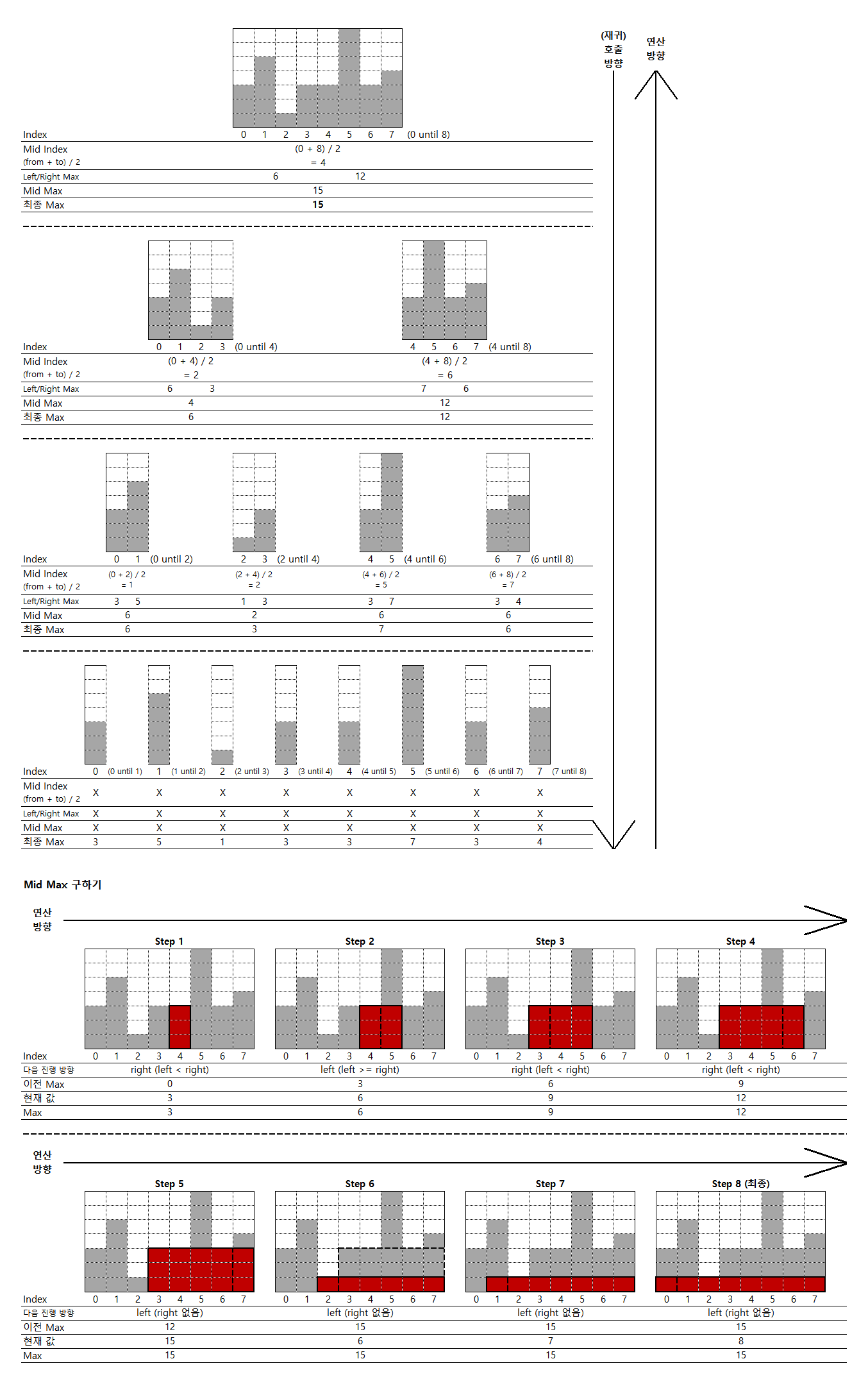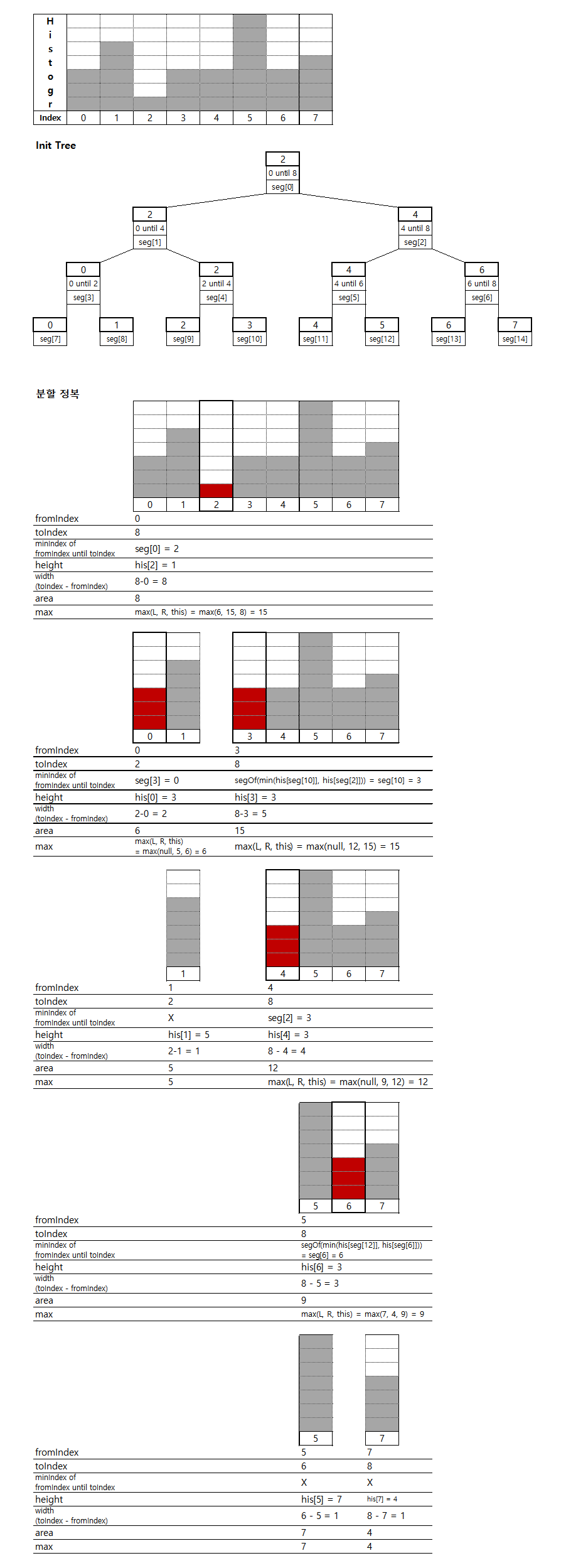문제
6549 히스토그램에서 가장 큰 직사각형
스택 사용 방법
풀이
답
kotlin code
fun main() {
val inputList = mutableListOf<IntArray>()
while (true)
{
val line = readln().trim()
if(line == "0") break
if(line.isEmpty()) continue
inputList.add(line.split(" ").drop(1).map { it.toInt() }.toIntArray())
}
for(histogram in inputList) {
println(getMaxArea(histogram))
}
}
fun getMaxArea(histogram: IntArray): Long {
val stack = java.util.Stack<Int>()
var max = 0L
for((index, curHeight) in histogram.withIndex()) {
max = getMaxArea(index, max, stack, histogram, curHeight)
stack.push(index)
}
while(stack.isNotEmpty()) {
max = getMaxArea(histogram.size, max, stack, histogram)
}
return max
}
private fun getMaxArea(index: Int, curMax: Long, stack: java.util.Stack<Int>, histogram: IntArray, curHeight: Int = -1): Long {
var max = curMax
while (stack.isNotEmpty() && curHeight <= histogram[stack.peek()]) {
val height = histogram[stack.pop()].toLong()
val width = (index - stack.peekOrDefault() - 1)
max = kotlin.math.max(max, height * width)
}
return max
}
fun java.util.Stack<Int>.peekOrDefault(defaultValue: Int = -1): Int = when {
empty() -> defaultValue
else -> this.peek()
}
분할 정복법
풀이
답
kotlin code
fun main() {
val inputList = mutableListOf<IntArray>()
while (true)
{
val line = readln().trim()
if(line == "0") break
if(line.isEmpty()) continue
inputList.add(line.split(" ").drop(1).map { it.toInt() }.toIntArray())
}
for(histogram in inputList) {
println(getMaxArea(0, histogram.size, histogram))
}
}
fun getMaxArea(fromIndex: Int, toIndex: Int, histogram: IntArray): Long = when(fromIndex) {
toIndex - 1 -> histogram[fromIndex].toLong()
else -> {
val midIndex = (fromIndex + toIndex) / 2
val leftMaxArea = getMaxArea(fromIndex, midIndex, histogram)
val rightMaxArea = getMaxArea(midIndex, toIndex, histogram)
val midMaxArea = getMidMaxArea(fromIndex, toIndex, midIndex, histogram)
kotlin.math.max(kotlin.math.max(leftMaxArea, rightMaxArea), midMaxArea)
}
}
fun getMidMaxArea(fromIndex: Int, toIndex: Int, midIndex: Int, histogram: IntArray): Long {
var leftIndex = midIndex
var rightIndex = midIndex
val lastIndex = toIndex - 1
var height = histogram[midIndex].toLong()
var maxArea = height
while (fromIndex < leftIndex && rightIndex < lastIndex) {
if(height == 0L || maxArea > (toIndex - fromIndex) * height) return maxArea
val curHeight =
if (histogram[leftIndex - 1] >= histogram[rightIndex + 1]) histogram[--leftIndex].toLong()
else histogram[++rightIndex].toLong()
if (curHeight < height) height = curHeight
val width = rightIndex - leftIndex + 1
val area = height * width
if (area > maxArea) maxArea = area
}
while (fromIndex < leftIndex) {
if(height == 0L || maxArea > (toIndex - fromIndex) * height) return maxArea
val curHeight = histogram[--leftIndex].toLong()
if (curHeight < height) height = curHeight
val width = rightIndex - leftIndex + 1
val area = height * width
if (area > maxArea) maxArea = area
}
while (rightIndex < lastIndex) {
if(height == 0L || maxArea > (toIndex - fromIndex) * height) return maxArea
val curHeight = histogram[++rightIndex].toLong()
if (curHeight < height) height = curHeight
val width = rightIndex - leftIndex + 1
val area = height * width
if (area > maxArea) maxArea = area
}
return maxArea
}
Segment Tree + 분할 정복법
풀이
답
kotlin code
fun main() {
val inputList = mutableListOf<IntArray>()
while (true)
{
val line = readln().trim()
if(line == "0") break
if(line.isEmpty()) continue
inputList.add(line.split(" ").drop(1).map { it.toInt() }.toIntArray())
}
for(histogram in inputList) {
println(getMaxArea(histogram))
}
}
fun getMaxArea(histogram: IntArray): Long {
val segmentTree = getSegmentTree(histogram)
return getMaxArea(0, histogram.size, segmentTree, histogram)
}
fun getMaxArea(startIndex: Int, endIndex: Int, segmentTree: IntArray, histogram: IntArray): Long = when {
startIndex == endIndex - 1 -> histogram[startIndex].toLong() * (endIndex - startIndex)
startIndex >= endIndex -> 0L
else -> {
val minIndex = getMinIndex(0, 0, histogram.size, startIndex, endIndex, segmentTree, histogram)
val leftArea = getMaxArea(startIndex, minIndex, segmentTree, histogram)
val rightArea = getMaxArea(minIndex + 1, endIndex, segmentTree, histogram)
val thisArea = histogram[minIndex].toLong() * (endIndex - startIndex)
kotlin.math.max(kotlin.math.max(leftArea, rightArea), thisArea)
}
}
fun Int.getLeftNode() = this * 2 + 1
fun Int.getRightNode() = this * 2 + 2
fun getMinIndex(node: Int, histogramFromIndex: Int, histogramToIndex: Int, targetFromIndex: Int, targetToIndex: Int, segmentTree: IntArray, histogram: IntArray): Int {
if(targetToIndex <= histogramFromIndex || histogramToIndex <= targetFromIndex) return -1
if(histogramFromIndex >= targetFromIndex && targetToIndex >= histogramToIndex) return segmentTree[node]
val histogramMidIndex = kotlin.math.ceil((histogramFromIndex + histogramToIndex) / 2.0).toInt()
val leftIndex = getMinIndex(
node.getLeftNode(),
histogramFromIndex,
histogramMidIndex,
targetFromIndex,
targetToIndex,
segmentTree,
histogram
)
val rightIndex = getMinIndex(
node.getRightNode(),
histogramMidIndex,
histogramToIndex,
targetFromIndex,
targetToIndex,
segmentTree,
histogram
)
if(leftIndex == -1) return rightIndex
if(rightIndex == -1) return leftIndex
return if(histogram[leftIndex] <= histogram[rightIndex]) leftIndex else rightIndex
}
private fun getSegmentTree(histogram: IntArray): IntArray {
val segmentTree = IntArray(histogram.getTreeSize()) { -1 }
initTree(0, 0, histogram.size, segmentTree, histogram)
return segmentTree
}
private fun initTree(node: Int, startIndex: Int, endIndex: Int, segmentTree: IntArray, histogram: IntArray): Int = when (startIndex) {
endIndex - 1 -> {
segmentTree[node] = startIndex
segmentTree[node]
}
else -> {
val midIndex = getTreeMidIndex(startIndex, endIndex)
val left = initTree(node.getLeftNode(), startIndex, midIndex, segmentTree, histogram)
val right = initTree(node.getRightNode(), midIndex, endIndex, segmentTree, histogram)
segmentTree[node] = if(histogram[left] <= histogram[right]) left else right
segmentTree[node]
}
}
private fun IntArray.getTreeSize() = Math.pow(2.0, kotlin.math.ceil(kotlin.math.log2(this.size.toDouble()))).toInt() * 2 - 1
private fun getTreeMidIndex(startIndex: Int, endIndex: Int) = kotlin.math.ceil((startIndex + endIndex) / 2.0).toInt()



